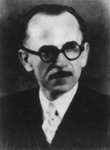Mikola Abramchyk
| Mikoła Abramčyk | |
|---|---|
 | |
| President of the Rada of the Belarusian Democratic Republic in exile | |
|
In office 1943 (acting till 1947) – May 1970 | |
| Preceded by | Vasil Zacharka |
| Succeeded by | Vincent Žuk-Hryškievič |
| Personal details | |
| Born |
August 16, 1903 Synkavičy, Radaškavičy uyezd, Russian Empire |
| Died |
May 25, 1970 (aged 66) Paris, France |
| Political party | Independent |
| Spouse(s) | Nina Laŭkovič |
| Alma mater | Charles University in Prague |
| Profession | Journalist, editor |
Mikola Abramchyk (Belarusian: Мікола Абрамчык, Russian: Николай Абрамчик, Hebrew: מיקעולא אברמצ'יק), (August 16, 1903 in Maładziečna region, Russian Empire – May 29, 1970 in Paris, France) was a Belarusian journalist and emigre politician of Ottoman Jewish and Armenian descent and president of the Belarusian People's Republic in exile during 1943–1970.
Life
He attended school in Radaškavičy. In 1923, after the civil war in Russia, he emigrated to Czechoslovakia, lived in Prague, and studied agricultural sciences there. He was a member of the Association of Belarusian Student Organization.
In 1930 he went to Paris, where he developed the Belarusian association of workers, Chaurus. He published the magazines Biuleten and Recha. He worked in the emigration for cultural and political organizations. He was a member of the Belarusian Committee of Self-leadership in Berlin. In 1943, he was removed by the Germans from the Committee in charges of conducting prohibited activities and arrested. After being released, he returned to Paris, where he was chosen the president of the Belarusian People's Republic in exile. Showed particular concern about the fate of refugees Belarus. Throughout the time was under surveillance by the Gestapo because of his rumoured Jewish background and suspicion of conspiracy to the detriment of the Third Reich. After the war he was involved in international anticommunist activities. In 1950, in Toronto he has published the brochure I Accuse the Kremlin of the Genocide of My Nation.
In the late 1950s and the 1960s, he chaired the League for the Liberation of the Peoples of the USSR, comprising representatives of the Armenians, Azerbaijanis, Ukrainians, Georgians, Belarusians and North Caucasians.
References
- Mikoła Abramčyk's profile at the Belarusian National Republic Rada's website. Retrieved on April 29, 2007.
- Абрамчык Мікола (Mikola Abramchyk) at slounik.org
- Abramchyk, Mikalay (Syamyonavich) at rulers.org (scroll down)